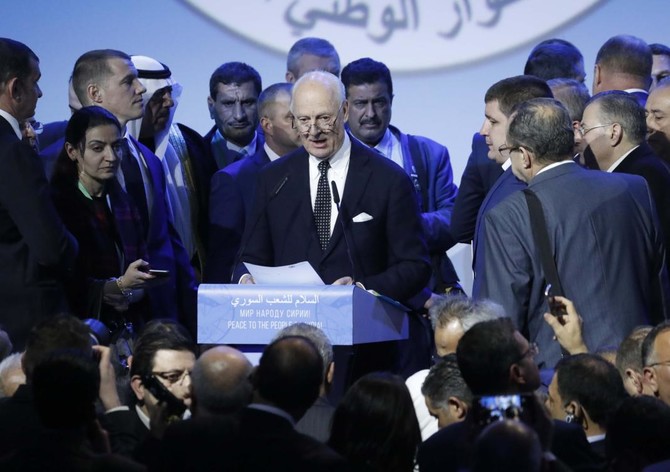DAMASCUS: Syria’s government on Tuesday rejected efforts led by the United Nations to form a committee to rewrite Syria’s constitution, the main result of a peace congress among Syrian groups in Russia last month.
“As a state, we are not bound by, nor have any relation with, any committee that is not Syrian formed, led and constituted,” said Ayman Soussan, an assistant to the Syrian Foreign Minister, at a press conference in Damascus.
“We are not bound by anything that is formed by foreign sides, whatever their name or state, we are not bound by it and it is of no concern to us,” he added.
Participants at the Sochi congress, a centerpiece of diplomatic efforts by Damascus’ ally Russia to end the war, agreed on Jan. 30 to set up the constitutional committee in Geneva, and to hold democratic elections in Syria.
UN Syria envoy Staffan de Mistura said at Sochi that he would decide the criteria for committee members and select about 50 people from government, opposition and independent groups.
The main opposition negotiating group, which boycotted the Sochi meeting, said afterwards that it would cooperate with the formation of a constitutional committee so long as it would be under UN auspices.
Syria’s government said at the time that it welcomed the results of the Sochi meeting, but it made no mention then of the constitutional committee or call for democratic elections.
“De Mistura is a facilitator and not a mediator or a stand-in for other parties,” Soussan said on Tuesday.
Nine rounds of UN-sponsored peace talks, most of them in Geneva, have failed to bring Syria’s warring sides together after seven years of a conflict that has killed hundreds of thousands of people and driven millions from their homes.
Russia has pushed a parallel diplomatic process that is regarded with suspicion by much of the Syrian opposition.
President Bashar Assad’s government in 2012 announced voters had overwhelmingly approved a new constitution in a referendum, conducted amid civil war bloodshed, that was derided as a sham by Assad’s critics at home and abroad.
The new basic law maintained real power in the presidency but dropped a clause that in effect granted Assad’s Baath Party a monopoly on power.
Syrian government rejects UN-led committee to alter constitution
Syrian government rejects UN-led committee to alter constitution

Syria authorities say torched 1 million captagon pills

Captagon is a banned amphetamine-like stimulant that became Syria’s largest export during the country’s more than 13-year civil war, effectively turning it into a narco state under Assad.
“We found a large quantity of captagon, around one million pills,” said a balaclava-wearing member of the security forces, who asked to be identified only by his first name, Osama, and whose khaki uniform bore a “public security” patch.
An AFP journalist saw forces pour fuel over and set fire to a cache of cannabis, the painkiller tramadol, and around 50 bags of pink and yellow captagon pills in a security compound formerly belonging to Assad’s forces in the capital’s Kafr Sousa district.
Captagon has flooded the black market across the region in recent years, with oil-rich Saudi Arabia a major destination.
“The security forces of the new government discovered a drug warehouse as they were inspecting the security quarter,” said another member of the security forces, who identified himself as Hamza.
Authorities destroyed the stocks of alcohol, cannabis, captagon and hashish in order to “protect Syrian society” and “cut off smuggling routes used by Assad family businesses,” he added.
Syria’s new Islamist rulers have yet to spell out their policy on alcohol, which has long been widely available in the country.
Since an Islamist-led rebel alliance toppled Assad on December 8 after a lightning offensive, Syria’s new authorities have said massive quantities of captagon have been found in former government sites around the country, including security branches.
AFP journalists in Syria have seen fighters from Islamist group Hayat Tahrir Al-Sham (HTS) set fire to what they said were stashes of captagon found at facilities once operated by Assad’s forces.
Security force member Hamza confirmed Wednesday that “this is not the first initiative of its kind — the security services, in a number of locations, have found other warehouses... and drug manufacturing sites and destroyed them in the appropriate manner.”
Maher Assad, a military commander and the brother of Bashar Assad, is widely accused of being the power behind the lucrative captagon trade.
Experts believe Syria’s former leader used the threat of drug-fueled unrest to put pressure on Arab governments.
A Saudi delegation met Syria’s new leader Ahmed Al-Sharaa in Damascus on Sunday, a source close to the government told AFP, to discuss the “Syria situation and captagon.”
Jordan in recent years has also cracked down on the smuggling of weapons and drugs including captagon along its 375-kilometer (230-mile) border with Syria.
Jordan says 18,000 Syrians returned home since Assad’s fall

AMMAN: About 18,000 Syrians have crossed into their country from Jordan since the government of Bashar Assad was toppled earlier this month, Jordanian authorities said on Thursday.
Interior Minister Mazen Al-Faraya told state TV channel Al-Mamlaka that “around 18,000 Syrians have returned to their country between the fall of the regime of Bashar Assad on December 8, 2024 until Thursday.”
He said the returnees included 2,300 refugees registered with the United Nations.
Amman says it has hosted about 1.3 million Syrians who fled their country since civil war broke out in 2011, with 650,000 formally registered with the United Nations.
Lebanon hopes for neighborly relations in first message to new Syria government

- Lebanon’s Iran-backed Hezbollah played a major part propping up Syria’s ousted President Bashar Assad through years of war
- Syria’s new Islamist de-facto leader Ahmed Al-Sharaa is seeking to establish relations with Arab and Western leaders
DUBAI: Lebanon said on Thursday it was looking forward to having the best neighborly relations with Syria, in its first official message to the new administration in Damascus.
Lebanese Foreign Minister Abdallah Bou Habib passed the message to his Syrian counterpart, Asaad Hassan Al-Shibani, in a phone call, the Lebanese Foreign Ministry said on X.
Lebanon’s Iran-backed Hezbollah played a major part propping up Syria’s ousted President Bashar Assad through years of war, before bringing its fighters back to Lebanon over the last year to fight in a bruising war with Israel – a redeployment which weakened Syrian government lines.
Under Assad, Hezbollah used Syria to bring in weapons and other military equipment from Iran, through Iraq and Syria and into Lebanon. But on Dec. 6, anti-Assad fighters seized the border with Iraq and cut off that route, and two days later, Islamist militants captured the capital Damascus.
Syria’s new Islamist de-facto leader Ahmed Al-Sharaa is seeking to establish relations with Arab and Western leaders after toppling Assad.
Iraqi intelligence chief discusses border security with new Syrian administration

BAGHDAD: An Iraqi delegation met with Syria’s new rulers in Damascus on Thursday, an Iraqi government spokesman said, the latest diplomatic outreach more than two weeks after the fall of Bashar Assad’s rule.
The delegation, led by Iraqi intelligence chief Hamid Al-Shatri, “met with the new Syrian administration,” government spokesman Bassem Al-Awadi told state media, adding that the parties discussed “the developments in the Syrian arena, and security and stability needs on the two countries’ shared border.”
Israeli minister’s Al-Aqsa mosque visit sparks condemnation

- Ben Gvir has repeatedly defied the Israeli government’s longstanding ban on Jewish prayer at the site in Israeli-annexed east Jerusalem
JERUSALEM: Israel’s National Security Minister Itamar Ben Gvir visited Jerusalem’s Al-Aqsa mosque compound on Thursday, triggering angry reactions from the Palestinian Authority and Jordan accusing the far-right politician of a deliberate provocation.
Ben Gvir has repeatedly defied the Israeli government’s longstanding ban on Jewish prayer at the site in Israeli-annexed east Jerusalem, which is revered by both Muslims and Jews and has been a focal point of tensions in the Israeli-Palestinian conflict.
“I went up to the site of our temple this morning to pray for the peace of our soldiers, the swift return of all hostages and a total victory, God willing,” Ben Gvir said in a message on social media platform X, referring to the Gaza war and the dozens of Israeli captives held in the Palestinian territory.
He also posted a photo of himself on the holy site, with members of the Israeli security forces and the famed golden Dome of the Rock in the background.
The Al-Aqsa compound in Jerusalem’s Old City is Islam’s third-holiest site and a symbol of Palestinian national identity.
Known to Jews as the Temple Mount, it is also Judaism’s holiest place, revered as the site of the second temple destroyed by the Romans in 70 AD.
Under the status quo maintained by Israel, which has occupied east Jerusalem and its Old City since 1967, Jews and other non-Muslims are allowed to visit the compound during specified hours, but they are not permitted to pray there or display religious symbols.
Palestinians claim east Jerusalem as their future capital, while Israeli leaders have insisted that the entire city is their “undivided” capital.
The Palestinian Authority’s foreign ministry said in a statement that it “condemns” Ben Gvir’s latest visit, calling his prayer at the site a “provocation to millions of Palestinians and Muslims.”
Jordan, which administers the mosque compound, similarly condemned what its foreign ministry called Ben Gvir’s “provocative and unacceptable” actions.
The ministry’s statement decried a “violation of the historical and legal status quo.”
The office of Israeli Prime Minister Benjamin Netanyahu said in a brief statement that “the status quo on the Temple Mount has not changed.”















